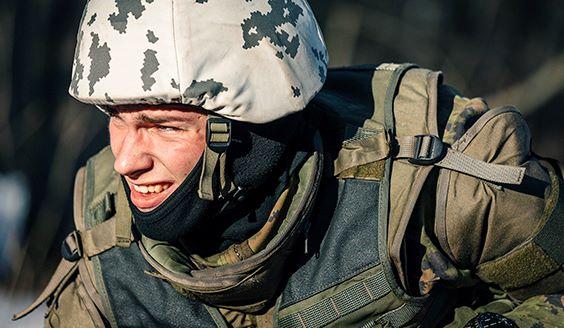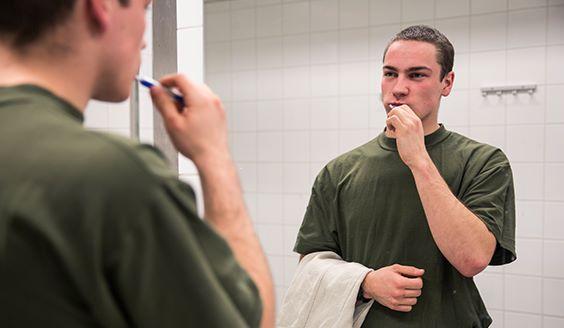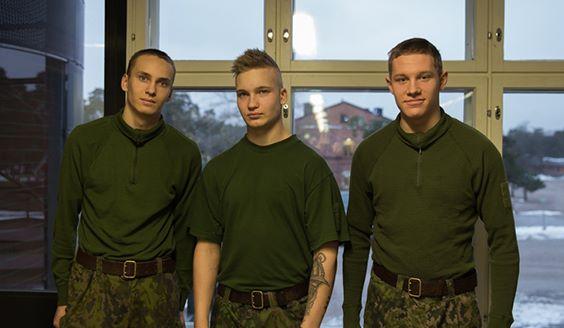Starting military service may be a big change in a young person's life

Starting military service may be a big change for many young people. The social environment and operating culture can be very different from what they are used to. Approximately 10,000 recruits started their military service in the Army on 2 January. About 300 of them are women in voluntary military service.
The first few weeks in service are vital for adapting into the environment and the operating culture. The training is progressive and the physical and mental strain is increased in phases. During the first days the recruits become familiar with the daily life in the army and ways of doing things. The training starts immediately but everything is taught thoroughly and you are not expected to know them in the beginning of the service. The recruits are first taught, among other things, customs and courtesies, including how to salute or how to address superiors. The recruits train in weapons handling during weapons and marksmanship training and the first live rounds are fired already during the first weeks.

Photo: Morning and evening routines are a regular everyday routine of the Army.
In the beginning, in addition to training it is also important to get to know your fellow soldiers. As the service time progresses and social bonds grow tighter, many physically and mentally stressful situations are easier to handle with the help and support of your fellow conscripts.
Conscripts' experiences of the first few weeks
Recruits Kim Andersson and Tomi Honkaniemi, both from Helsinki, started their military service in the Guard Jaeger Regiment's 1st Jaeger Company. Andersson looked forward to starting his service with a feeling of "good kind of excitement". The first thoughts of entering military service popped his mind when the call-up letter arrived with the post. Honkaniemi started his service with a positive attitude and didn't stress over starting his military service. His first thoughts of entering military service came as his older brother started his military service.
- The first day felt a bit confusing. Although we were told what happens during the day, it was unclear because we didn't know the places or the distances between the places. Or what things actually meant because everything was new, says Andersson.
When talking about the skills they have learned during the first weeks, both recruits smile and answer that they have learned how to sit absolutely still upon the order, as is the defence forces' custom. Additionally, they have already had weapons handling training and have been shooting as well. Both Andersson and Honkaniemi are prepared to serve the longest period for conscripts which is 347 days. - My goal is to get into the non-commissioned officer (NCO) school and possibly even to Reserve Officer School, says Honkaniemi.
Corporal Joona Salminen has graduated from the NCO school just before Christmas and his leadership period has just begun. - The leadership period has started well and we have a good platoon, he thinks. Thinking back to starting his own service he remembers that it was difficult, because the change and differences from civilian life were so big. Salminen wants to give the following advice to the recruits who are now at the beginning of their service:
- Remember that camaraderie means a lot and things are easier when you do them together.

In the picture, from the left: recruit Honkaniemi, corporal Salminen and recruit Andersson
Support during conscript service
People come to military service from very different backgrounds, but the goal of the Finnish Defence Forces is to provide such conditions for the service, that everyone can do their military service without worries. As well as having an important part in maintaining readiness, the different geographic locations of the units enables assigning conscripts to serve in garrisons that are close to their home municipalities. This aims to ensure that the disruptions to the recruit's social environment and his or her family is minimal during military service. The conscripts assigned to the Guard Jaeger Regiment mainly come from the capital region and Uusimaa. For example, 90% of the recruits that started their service in January came from these areas.
Jarmo Österlund, the social welfare counsellor for the Regiment, says there are many avenues for support for the conscripts. The personnel at the garrison health centre offer support for physical problems, but they will help also with psychological care. The unit's social welfare counsellors help the conscripts manage their social and economic issues but they can also help with psychological issues. The chaplain is responsible for spiritual support but s/he is there also to help with coping with the challenges of military service. Furthermore, unit personnel, conscript leaders and the conscript committee have their own roles and there are also various telephone help lines available.
- The social welfare counsellors are there during the first day of the service and we will have classes for all of the recruits during the first week. During the classes we present these support options. We can react to the recruits' contact requests very quickly, either during the same day or the next day at the latest. So, we have high readiness, says Österlund.
The support person network works closely together and also with parties outside the units. For example, the social welfare counsellors work together with the nearby cities and municipalities. They also participate in the Youth Welfare Network working group managed by the city of Helsinki as the representatives of the regiment.
Additionally, the conscript's own personal support network plays a large part in how well the time in service starts off. During their classes, the social welfare counsellors remind the recruits to maintain and cultivate their relationships with family and friends during military service. When problems appear, the social welfare counsellors are there to support the family members or girl/boyfriends of the conscript as well. If there are relationship problems that the recruit needs support with, the girl/boyfriend may be invited to the garrison to talk with the recruit, who is in military service, and the social welfare counsellor.



